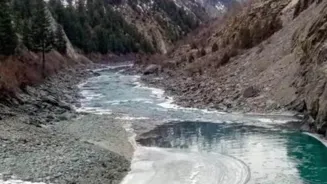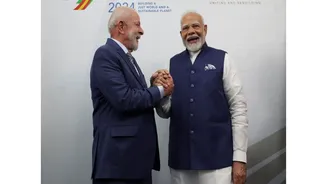Heightened tensions and nuclear rhetoric from top Pakistani leaders have been followed by Islamabad urging New Delhi to restore the full operation of the Indus Waters Treaty — a pact India has kept suspended
since May after the terror attack in Jammu and Kashmir’s Pahalgam. Pakistan’s Foreign Office reiterated its commitment to full enforcement of the treaty and welcomed the latest interpretation issued by the Court of Arbitration.
The appeal comes in the wake of a nuclear strike warning from Pakistan’s Army chief, Asim Munir, and aggressive remarks by former foreign minister Bilawal Bhutto Zardari over India’s position on the water-sharing agreement.
Pakistan’s Request To India
Pakistan said it welcomed the Award rendered by the Court of Arbitration on August 8, 2025, concerning the general interpretation of the Indus Waters Treaty (IWT), an award made public on the court’s website. The ruling clarifies the design criteria for new run-of-river hydropower projects to be built by India on the Western Rivers — Chenab, Jhelum, and Indus.
In a key finding, the Court directed that India must “let flow” the waters of the Western Rivers for Pakistan’s unrestricted use. It further said that exceptions for hydroelectric generation must strictly adhere to treaty requirements, rather than India’s interpretation of “ideal” or “best practices.”
Pakistan reiterated that it remains committed to the full implementation of the Indus Waters Treaty and urged India to immediately resume normal treaty operations in line with the Court of Arbitration’s award.
India’s Stand On ‘Illegal’ Court Of Arbitration
India has never accepted the legal validity of the so-called Court of Arbitration, maintaining from the outset that the formation of this arbitral body itself constitutes a grave violation of the Indus Waters Treaty.
As a result, India holds that any proceedings conducted by this forum, and any award or ruling it issues, are unlawful and inherently null and void.
In the aftermath of the Pahalgam terrorist attack, India, acting within its sovereign rights under international law, suspended the Indus Waters Treaty until Pakistan credibly and irreversibly renounces its support for cross-border terrorism. For as long as the treaty remains in suspension, India is under no obligation to fulfil any of its commitments under it. Moreover, no Court of Arbitration — especially one that India considers illegally constituted and devoid of legal standing — has the authority to assess the legitimacy of India’s actions undertaken in the exercise of its sovereign rights.
















